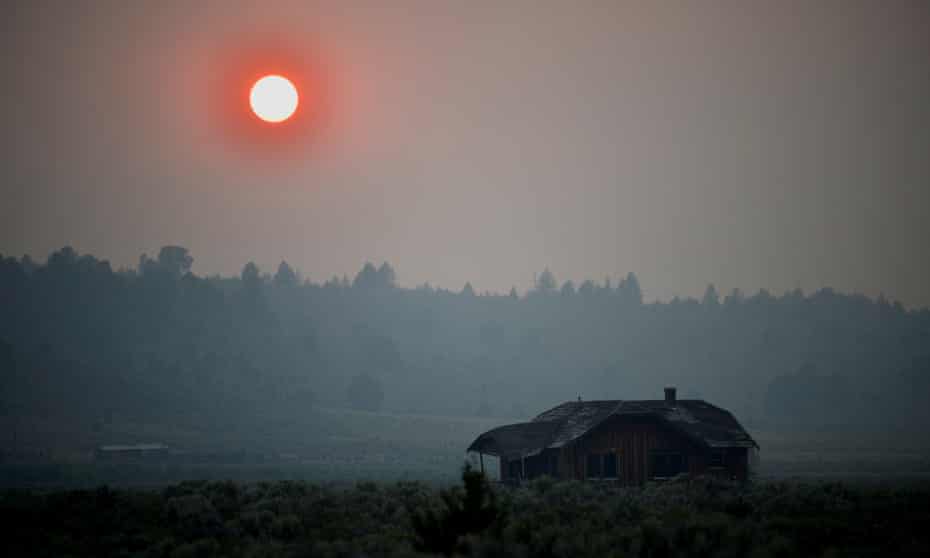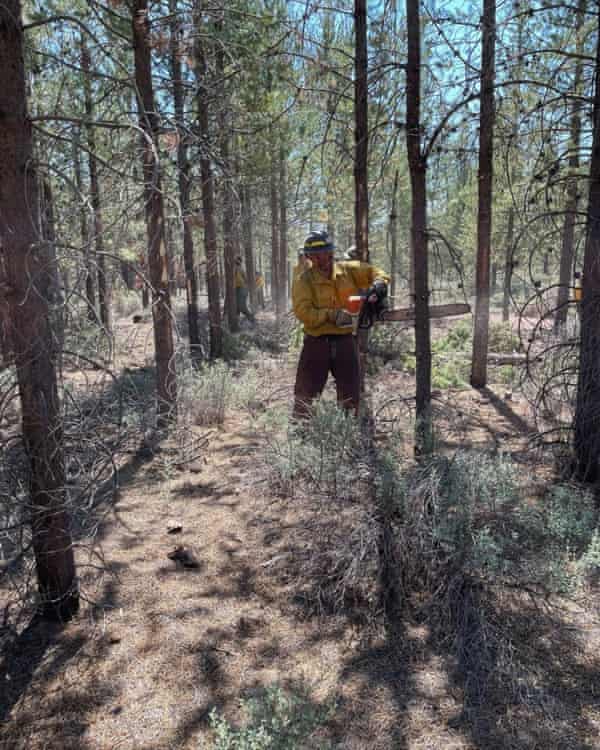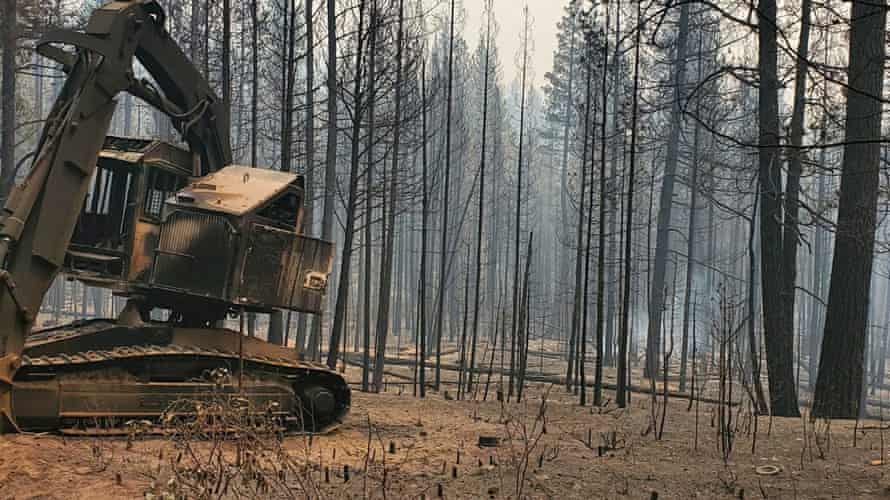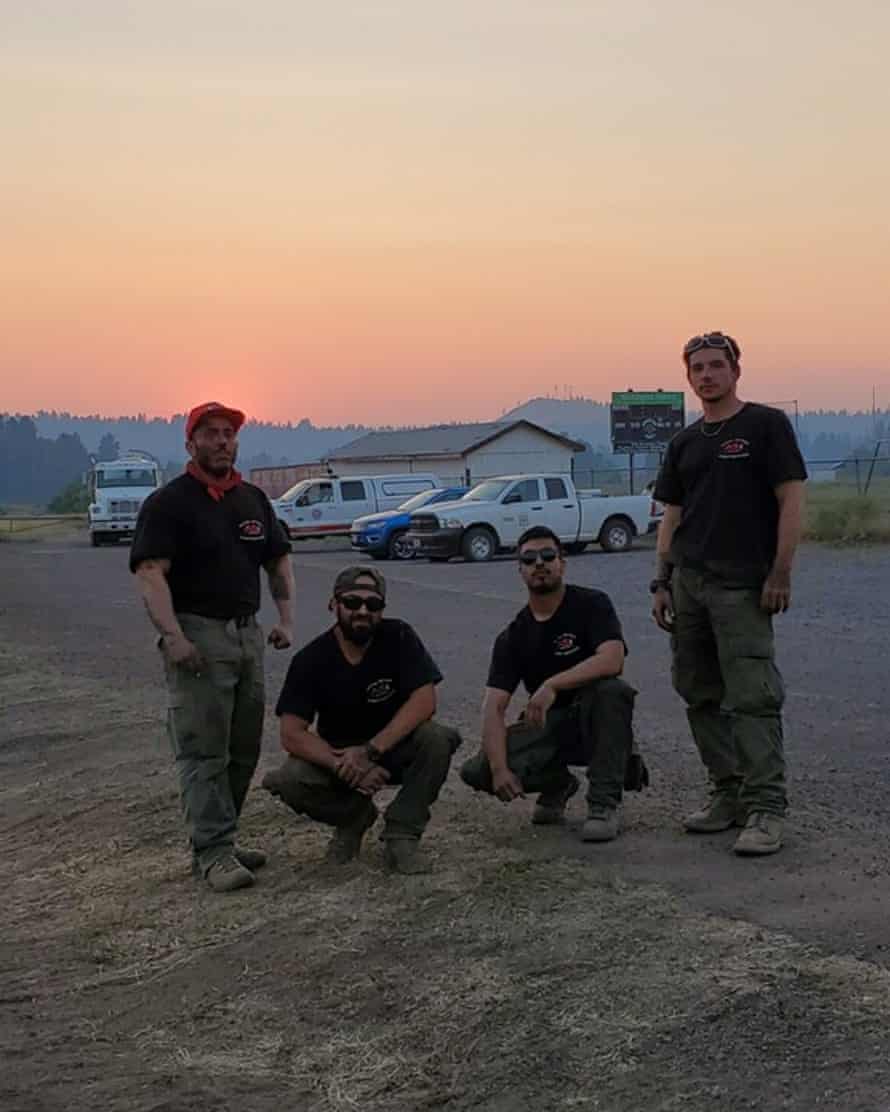Extract from The Guardian
Climate crisis in the American west
I’m proud to take on devastating blazes. But sometimes I wonder if anyone else sees the scale of the crisis.

Thick smoke causes the sun to glow red over an abandoned farmhouse as the Bootleg fire expands near Beatty, Oregon.
Last modified on Thu 15 Jul 2021 22.56 AEST
I’m a firefighter currently battling the Bootleg fire in southern Oregon, the largest blaze right now in the US. As I write this, it’s already ripped through over 200,000 acres (312.5 sq miles).
I’m part of a crew that arrived last Thursday. We were one of the first on the scene, and several of us have already gotten heat exhaustion, one guy got fuel in his eye from a water pump and two of our division’s masticators (giant machinery that functions like a lawn mower but for an entire forest) burned up.
As fire beetles bit me and bits of ash fell into my mouth, we walked slowly, 10ft apart, from a thick line cleared of anything flammable.
Right now, it’s about 8.30pm on Tuesday and I just got off a 14-hour shift involving leading a team of four through a fire-scorched area that reminded me of images of a nuked zone. There were some trees still standing in the singed earth, most dead and burned up and ready to fall. It was like a black and grey Christmas scene, where instead of snow it’s ash and char.
As fire beetles bit me and bits of ash fell into my mouth, we walked slowly, 10ft apart, from a thick line cleared of anything flammable by a bulldozer. We worked within a mile-long section, meticulously feeling around for anything that could still be hot. When we found something, we came together to dig it up, spray it with our hose and mix it with the water. We’d leave it behind once it was cool to the touch. By the end of the day we’d put out 18 hotspots, which ranged from some embers and coals the size of a baseball to a 2ft by 2ft root system that left a hole almost as deep as I am tall.
When I’m on the job, I rely on four gallons of water and bottles of Gatorade to get through each day. I just scarfed down a meal of chopped turkey, mashed potatoes and salad, handed out on a Styrofoam tray at the local school. Some crew are taking showers or calling home, letting their family know they’re safe.

Matthew Montoya on the day he got heat exhaustion. Photograph: Jose Cruz/Handout
Fighting fires is extremely strenuous, something I was reminded of during my recent painful encounter with heat exhaustion. I’d been cutting down trees with a chainsaw in 95F (35C) heat on Saturday afternoon when I started to feel dizzy and weak. My crew of 20 and I had been out on the western side of the blaze since the early morning, moving brush to try to keep the fire at bay. But taking over on the chainsaw meant adding safety glasses and thick chaps to my already sweat-soaked, fire-retardant uniform at the hottest part of the day.
In the end I was lucky. A medic massaged my chin so that it would open and I could drink, my boss sprayed cold water on me and I was able to get back to work within about an hour. I brushed it off as just one of the many dangers you face every second fighting wildfires during a year of record-breaking heat and unbelievably dry conditions.
But even with all of this, it’s looking like we might be the first crew to put some black line on the map, which basically means we’ve completely contained a section. I’m pretty proud of that.

One of the masticators that was burnt. Photograph: Handout
I’ve been a firefighter for four years and I love the work. I’m 38, so you might say I got something of a late start. I was in federal prison for a few years – the result of being caught with a gun after already having three violent felonies on my record.
Fires are getting worse, and with everything drying up they’re going to get closer and closer to home. Sometimes I wonder if anyone else is even noticing.
But even in such a short time, I’ve worked on some of the largest fires the country has seen in decades, including the Lionshead fire in Oregon last year. During that one, I actually fell thigh-deep into a pit of boiling dirt and ash. It felt like I’d been covered in hot baby powder in the seconds before a crewmember pulled me out. Luckily, I came away with only a very sore and seemingly sunburned leg.
These days, there’s all this debate about global warming and how our climate could change. But the fact is, fires are getting worse right now and with everything drying up they’re going to get closer and closer to home. Sometimes I wonder if anyone else is even noticing what’s happening.
I get messages from my 18-year-old daughter and my mother, who she stays with during fire season. The other night she asked me if Top Ramen expires and sent a photo of her and her grandmother cuddling. I told her I loved her.

Montoya (on the far left) with other crew members. Photograph: Handout
There’s times I find myself forgetting what day it is. We don’t get much sleep out here, and days are exhausting. My Achilles tendon is killing me and my traps are sore. But I still feel like I’m staying strong mentally.
Sometimes I think about everything I’m able to do in a single day and wonder how I’m not even more tired. Maybe it’s all of the people praying for us and relying on our work or maybe it’s just knowing all of the homes and other important spaces we’re protecting. Whatever it is, I’m glad it’s there.
As told to Hallie Golden
No comments:
Post a Comment